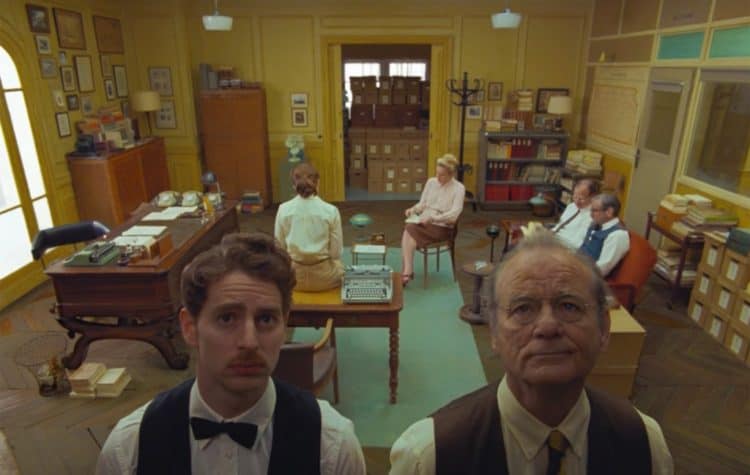
Wes Anderson’s first live action feature since his classic, The Grand Budapest Hotel, made its way into theaters during awards season and the concept of The French Dispatch is pretty simple: The 2021 feature is a series of three short stories in an outpost of the American newspaper in a fictional 20th-century French city. The French Dispatch features a huge roster of stars, but the central focus is on Jeffrey Wright, Bill Murray, Frances McDormand, Timothee Chalamet, Adrien Brody, Benicio Del Toro, and Lea Seydoux. Now, upon release, the feature had mixed reviews, with some calling the feature dull, indulgent, and overstuffed; Is that truly the case with Wes Anderson’s latest film? Well, art is subjective, and in the case of Wes Anderson, you really have to be into his stylized filmmaking to enjoy The French Dispatch. If you follow Wes Anderson, you understand the type of movies that he tends to make are highly stylized, quirky features that feel like live-action cartoons. That’s the charm of Anderson’s movies because he understands his world and has gleefully mastered the art to great effect. Wes Anderson is the definition of what an arthouse film is, so he’s definitely not going to cater to the masses. However, behind the great visuals and colorful cast of characters is his sneaky way of exploring humans and the way we connect as people. That’s pretty much what The French Dispatch is. Is it too stylized? Maybe. Sometimes you’re marveling over the beautiful color palette or interesting environment to truly focus on the story unfolding in front of your eyes or even the numerous cameos throughout the feature. Usually, that’s a sign of a bad or boring film when your mind wonders about everything else but the story itself; however, that’s not the case with Anderson. His worlds are so rich and detailed that sometimes you get lost in the beauty of his art.
The three anthology stories are entertaining pieces when you take out the fascinating world behind them. The story of Benicio Del Toro and Simone is a fun little piece that explores the topic of love and the mind of an artist. Admittingly, Adrien Brody’s performance is over-the-top here. In the early portions of the story, he’s nicely grounded and playing along with Anderson’s quirks; however, he noticeably gets louder and cartoonish in a manner that sticks out like a sore thumb. As I previously mentioned, Anderson’s world is pretty much cartoonish. It allows the actors to be loose and have fun with their characters, but in general, the characters in his world are more often than not grounded beings who could actually fit into normal society. Sure, a character would do something that would stretch beyond reality, but the performances rarely do, which is why Brody’s over-the-top acting skills stand out in a world that’s mostly grounded performance wise. The second story, Revisions to a Manifesto, is something I consider the best. Timothee Chalamet is a newcomer to the Anderson world, and he fits in like a glove. Not surprisingly, Frances McDormand is great at showcasing the different sides of her character. Lucinda is tough and honest, but gentle and loving, and the chemistry between McDormand and Chalamet is pretty fun. However, the bigger standout is the unknown, Lyna Khoudri, who plays love interest/revolutionist Juliette. Her constant battles with Zeffirelli is funny, but more so engaging because of their seemingly meaningless tiffs that’s hidden behind a layer of complexity. Anderson’s beautiful worlds and fun dialogue can often mask the subtlety behind the messages of his films, and that’s often the case here. The imagery is simple at its best here, but the complicated dynamic between McDormand, Chalamet, and Khoudri are what keep your attention.
The third and final story, The Private Dining Room of the Police Commissioner, has a surprising amount of character work that centers around Jeffrey Wright’s Roebuck Wright. Like Chalamet, Wright is a newcomer to the Wes Anderson world and the veteran gives a gravatas that’s needed for his role. There’s actually an interesting aspect that Anderson doesn’t focus too much on during this segment, but Wright being an African American male caught in 20th century is surprisingly not explored all too much, though the story is mainly focused on the night he was invited to have Dinner with the Ennui Police Commissaire. The film also throws you off with an out-of-blue animated chase sequence that’s well done and quite entertaining. The French Dispatch is by no means perfect. There are moments that drag, and sequences can take you out of the experiences a bit. However, it’s a fun spectacle that’s overly scripted sometimes, but the performances are what help keep this beautiful feature on course. The French Dispatch is a good film, but again, it comes down to your subjective taste.
 Follow Us
Follow Us





